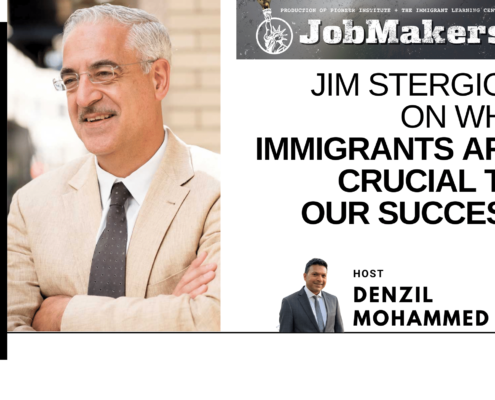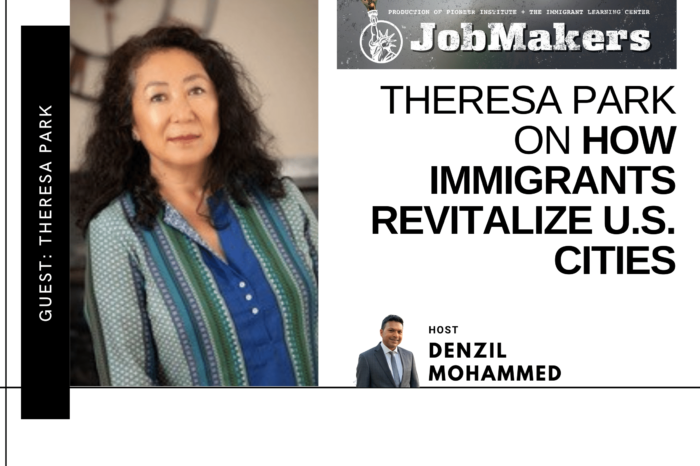Theresa Park on How Immigrants Revitalize U.S. Cities
/in Economic Opportunity, Featured, JobMakers /by Editorial StaffThis week on JobMakers, host Denzil Mohammed talks with Theresa Park, Deputy Director and Senior Executive Vice President at MassDevelopment, a group that offers financing and real estate solutions to drive economic growth across Massachusetts. An immigrant from Korea who moved to Lawrence, Massachusetts, Theresa saw first-hand how immigrants built their lives from the ground up, and in so doing brought economic and cultural vibrancy to their new home cities. And when she went on to work for cities like Lowell and Lawrence, she herself was the one to reach out to immigrant-owned businesses, nurture their growth, and see their broad impact. In this week’s JobMakers, Theresa talks us through her experience with immigrant business owners, how she developed their trust, how she celebrates them, and the many ways they enrich their new homeland.
Guest:
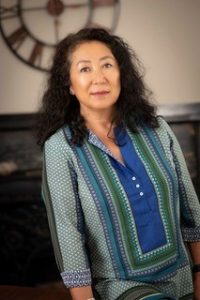 Theresa Park is Deputy Director and Senior Executive Vice President at MassDevelopment, the Bay State’s development finance agency and land bank. Theresa comes to MassDevelopment with 25 years of regional and municipal planning experience. She most recently served as the executive director of the Merrimack Valley Planning Commission. Theresa’s planning background includes serving as director of the office of planning and development for the City of Lawrence. Prior to that, she led economic development for the City of Lowell, was principal planner at the City of Newton, and held different roles in Cambridge. Theresa received her master’s in Urban and Regional Planning from The George Washington University and a bachelor’s in Business Administration from the University of Massachusetts – Amherst. Her non-work hours are spent serving on boards, globetrotting, and learning home-improvement projects.
Theresa Park is Deputy Director and Senior Executive Vice President at MassDevelopment, the Bay State’s development finance agency and land bank. Theresa comes to MassDevelopment with 25 years of regional and municipal planning experience. She most recently served as the executive director of the Merrimack Valley Planning Commission. Theresa’s planning background includes serving as director of the office of planning and development for the City of Lawrence. Prior to that, she led economic development for the City of Lowell, was principal planner at the City of Newton, and held different roles in Cambridge. Theresa received her master’s in Urban and Regional Planning from The George Washington University and a bachelor’s in Business Administration from the University of Massachusetts – Amherst. Her non-work hours are spent serving on boards, globetrotting, and learning home-improvement projects.
Get new episodes of JobMakers in your inbox!
Read a Transcript of This Episode
Please excuse typos.
Denzil Mohammed:
I’m Denzil Mohammed. And this is JobMakers.
Denzil Mohammed:
Immigrants have always been economic drivers and revitalizes, just look at lower mass or Lawrence, Massachusetts, or any of the gateway cities in your state. Immigrants tend to move into areas that are cheap, namely places in economic decline. Then they open up shops and businesses bring in goods and services and gradually revitalize these once downtrodden areas. For Theresa Park, deputy director and senior executive vice president at Mass Development, a group that offers financing and real estate solutions to drive economic growth across Massachusetts, she’s seen this up close and she’s lived it an immigrant from Korea who moved to Lawrence. She saw firsthand how immigrants built their lives from the ground up and in. So doing economic and cultural vibrancy to their new home cities. And when she went on to work for cities like Lowell and Lawrence, she herself was the one to reach out to immigrant or businesses, nurture their growth and see their broad impact. Theresa talks us through her experience with immigrant business owners, how she developed their trust, how she celebrates them, and the many ways they enrich their new Homeland in this week’s Jobmakers. Theresa Park, deputy director and senior executive vice president of MassDevelopment, welcome to the JobMakers podcast. How are you?
Theresa Park:
I’m very well. And thank you for having me. I’m thrilled to be here today.
Denzil Mohammed:
So tell us a little bit about the work you currently do.
Theresa Park:
So I’m now with MassDevelopment, a state agency. The bulk of my background is really in local government working in planning and development, economic development field. Last year I accepted a position with Mass Development. And Mass Development is the state’s financing agency,as well as its land bank. And so we get involved in a lot of development-related projects, primarily from the financing side, but we also provide real estate technical assistance, as well as offering grants and other programs,along with the states or through the states one-stop process, the application process and it’s a really good way to tap into other programs available through the state.
Denzil Mohammed:
And how does immigration figure into your work? When we see that one in seven Massachusetts residents is foreign-born and that they’re twice as likely to start a business, that they’ve been traditionally engines of economic growth in, you know, downtrodden parts of the country. And of course we have, Kendall square, for instance.
Theresa Park:
Right? So a couple things, one which is that you know, great things come from ideas, right? And you just never know where these ideas are gonna come from. And I think that immigrants by nature and we’ve heard said over and over again, which is that they already have a high tolerance for risk, right? Nobody leaves a country and goes to another country where they basically are complete strangers to the systems so many cultural aspects of it – but for the desire for a better opportunity and better life for their family. And I think that those drives translate very well in their ability to create and succeed in entrepreneurship and establishing new entities. And I think along that line, we also want to make sure as a state quasi agency, that the work that we do have can support good initiatives that we’re equitable in how we deliver those programs across the state, which is why we have programs that support business growth.
Theresa Park:
We have programs that support gateway cities. We have programs that support developers so that we could increase the housing that is in such great demand in the commonwealth. So we have a pretty good toolkit of programs and services that could be brought to bear. Now, we just want to make sure whether it is from the level of outreach, we do the engagement that we do, the people who can take advantage of those programs feel like we can be a partner to them. And so to that extent, the communications work that we’re doing, we want to make sure that whether it is I business started by immigrants, whether it is in communities where there may be a lot of immigrants. For example, you know, I live in the city of Lowell, for example, and they have, historically, been a gateway for immigrants in the beginning working in the textile industry, but that flow continues as well. And I think that there are great opportunities in places like Lowell and Lawrence and Lynn and other gateway cities. And we want to make sure that we get the word out and we make sure that we can deliver in a way that is meaningful.
Denzil Mohammed:
That is excellent. And I know that this is personal to you as well because you have your own immigrant story, is that right?
Theresa Park:
Yes. So I was not born in this country. I came from Korea at a very young age and when my family first moved here, we actually lived in the city of Lawrence a city that I would later come back and work as the planning director. And I think that experience where you are thrown into something just starkly different it’s kind of like the closest thing I could translate to right now is like, when you’re going on a trip, right, you leave one country, you get on a plane and you get on the other side. And then all of a sudden, like, there’s this sudden change in everything that, right. It’s just, everything is totally new and the immigrant experience is very similar in the sense that there’s this stark contrast, but at the same time, you’re making a much longer commitment.
Theresa Park:
And so you’re making a commitment to this new way of life. You’re making a commitment to, you know, from my parents’ perspective, like, you know, they worked hard for many, many years, so they can make sure that their kids get a good education and be successful. So I think that’s pretty typical of what other immigrant families experience. Some go on to, you know, start businesses,and succeed. I think the award dinner that you have every year, you know, recognizes the tremendous contributions that they have made from a job standpoint, the impact that they’ve had on neighborhoods as far as services.
Denzil Mohammed:
That is really well said. And I, I know this is directly from your experiences in cities like Lowell and Lawrence. Talk us through your experiences with the immigrant business community? How did you foster their growth? What was the response like from the rest of the community?
Theresa Park:
First of all, I love working in gateway cities. I feel like there’s a vibrancy. There’s a, there’s like, there’s this gumption, like, you know, you can throw an empty can or garbage and something beautiful can be made out of it. You know what I mean? It’s just like, you know, and I say this in the most positive way possible is that people can make great things with very little. And I see that in gateway cities, I think one of the beautiful things about both living and working there is one just, just the, the flavor, just the blending of this flavor, like, you know, and how it just adds to the, the vibrancy of life there. Right. And we have all these wonderful things like in Lowell, let’s take for example.
Theresa Park:
So we have the, National Historic Park, which looks at the history of the city and how that unfolded and how reliant actually was also in the immigrants to, to basically, you know, work the factories. We have a huge Cambodian population. So we had this amazing Cambodian neighborhood we all, but we also have folks from, you know, West and east Africa and south America. And it’s just like, it feels like a microcosm of the bigger planet. So for us trust building was a key part of our ability to succeed in working with small businesses, particularly immigrant entrepreneurs. So we made a point of being out in the neighborhood, visiting these businesses, not just once, but we appeared before them regularly. We knew we got, we heard their stories. We heard about what are the kind of things that could be helpful to them and when we can deliver on those things.
Theresa Park:
And we’re trying to make those connections point connection points to say that, okay, this is the what you had told us. This is what we can provide. And, and we, you know, and, and so we would make that connection. We had people on staff or within the larger department who could, who could speak different languages. So we try to take advantage of that from, so that it’s not always just you know, we could only interact in, in one language. Like we wanted to make sure that we could communicate at, at different levels. And to that extent, we want to make sure that, you know, whenever we did thing from marketing, for example, or pulling together collateral that talks about the work that we do, we were multilingual about it. We always made sure that the representation was very broad and encompassing of all the different types of businesses, not just the high tech, but the the neighborhood type mom and pop type of businesses because they will eventually hire people, right. Even, even though it was just like one or two jobs to me, that’s still, I mean, that’s still meaningful, right? Because that one person has a family. And because of that job, now they’re able to do these other things that they may not have been able to, to do before
Denzil Mohammed:
You brought up the immigrant entrepreneur awards, which my organization, the immigrant learning center hosts every year which is this year is happening in March 8th. And I have to say that we have a special category called business growth for fast growing businesses that are employing lots of people. And three of those winners were all Dominican American and all came from Lawrence. So lo you know, the reputation of certain cities like Lawrence they’re growing
Theresa Park:
People don’t invest in place without the belief that there is opportunity there.
Denzil Mohammed:
So how does being an immigrant, even though you were, you know, you arrived as such a young child, but you, you, you’re not only foreign born, but you also have a very global perspective having traveled around the world and continuing to do that. Do you think that that has given you a particular perspective in your work of planning and developing the development of cities?
Theresa Park:
I would say say one the best, the biggest life skill that I feel like I benefit from because of that immigrant experience, as well as the global travel is problem solving. You could present a problem, same problem in, in a lot of different places, you’re gonna get different kind of answers of different types of solutions. And I feel like if you travel and if you have the immigrant experience, it’s almost like you expand the range of your thinking in, in when you’re problem solving. Because it’s, you’re not just fixing a widget. You’re also thinking about in, in, in, I, I, for me personally, in a more complex way. And so, you know, so, you know, solving for problem X, all of a sudden you have all these different ways of addressing it.
Denzil Mohammed:
I remember a joke from tr ever know us of saying, you know, if you don’t like immigrants, then you’re not allowed to like immigrant food. So you just end up with a potato And we take grant, but
Theresa Park:
Some great things with that potato
Denzil Mohammed:
Of, of course, so many different things, but we take, we really do as people living in the United States take for granted the, the flavor that we are are given an offer every day in terms of food, in terms of holidays, in terms of cultures overall, though, you know, you’ve seen many different immigrant populations, starting businesses in different places. Have you, have you seen them integrate, you know, learning the language or, or, or their children being successful and things like that?
Theresa Park:
Yeah, I think, you know, so that has to do with when they come to this country, right. There’s a level, level of incarceration that needs to occur. Like, you know, if, you know, my parents came here when they were I think close to 40, maybe I, I can’t recall exactly, but, you know, like, and then they had to learn the language and, you know, they had to, you know gain, gain employment and so on. So I think the challenges are very real, real, I think it could be ease. So like I had mentioned earlier that when I came to this country that there weren’t a lot of Koreans. So we had to ACC ACC very quickly. I think that at the same time I think it could have been a, it could be lonely experience for people as well, where you don’t have your community.
Theresa Park:
I think the level of acculturation changes with the generation, I think when the parents first come here, they’re so busy working, whether that’s being, working for somebody or working for themselves. And you know, it’s really relying on the next generation to then more fully immerse take advantage of, you know, the well of the job opportunities that out there, the educational opportunities that are out there. So I think it happens immersion happens in a couple of different ways. I think if you come to a place where there is a ready community, I think that could help ease a transition. I think that is really important. Oftentimes you also find these cities, you, people who can act, provide be the connector to different kinds of programs and services, so they could get more so they could get grounded more readily, which hopefully means that they could then have more time to then you know, with there’s, you know, attending the kids parent-teacher meetings or whether maybe even attending a community meeting or it could be helping the next generation of immigrants that may be coming through the door, you know, help them with the acculturation.
Theresa Park:
But I think how quickly and how easily you can do that depends on how old you are when you come to this country. What kind of communities there to sort of ease a transition. And I think just remembering that people are always just trying to do their best and, and just always along and giving people the benefit of the doubt, because, you know, I, this is a really hateful rhetoric that’s come out of course. Right. and I think those either, and it’s based on some really unfounded misinformation, and I just hope that key people dig a little deeper people be a little bit more open minded and just remember that like for all part of the human race, right. And we have really have more in common than, than not
Denzil Mohammed:
That’s beautifully said. And I think at the end of the day, we have to remember that the economic development of immigrants through their businesses helped the entire community. It doesn’t just help that one immigrant it creates jobs, it creates more taxes, it creates a safer neighborhood increased goods and services. So you know, we did some research on immigrant essential workers during the pandemic and, you know, where they able left out of the cares act, for instance, things like that, impeded their ability to help all of us recover. We could have recovered faster. We could have recovered in a more efficient way. If you were to close off this, this podcast interview with a message for the us, when it comes to the value of the immigrant entrepreneurship and recognizing that value, what do you think would be,
Theresa Park:
I would say that if, if we were a formula, we’re a plus sign, not a minus sign from an immigrant standpoint, it’s not really for formula, but I would say that, you know, this, when we talk about immigration, we’re talking about people who are coming to this country because of what’s been touted about all that’s good about this country. And I think it was really important that we continue to prize what we hold dear in, in this country’s ability to be the beacon of light for freedom, for democracy and for opportunity for everybody.
Denzil Mohammed:
That’s very beautifully said, TheresaPark thank you so much. This was a wonderful interview. And thank you for sharing as well. Your own personal stories with us Theresa Park, deputy director, and senior executive vice president of Mass Development, thank you for joining us on the JobMakers podcast.
Theresa Park:
Thank you for having me, Denzil, so great to be here.
Denzil Mohammed:
Jobmakers is a weekly podcast about immigrant entrepreneurship and contributions produced by Pioneer Institute, a think tank in Boston and the Immigrant Learning Center in Malden, Massachusetts, a not-for-profit that gives immigrants a voice. Thank you for joining us for today’s insightful conversation on how entrepreneurial immigrants are a rebound for cities in decline. If you know an outstanding immigrant entrepreneur we should talk to email Denzil that’s, D E N Z I L at Jobmakerspodcast.org. I’m Denzel. Join us next Thursday at noon for another Jobmakers.
Related Posts
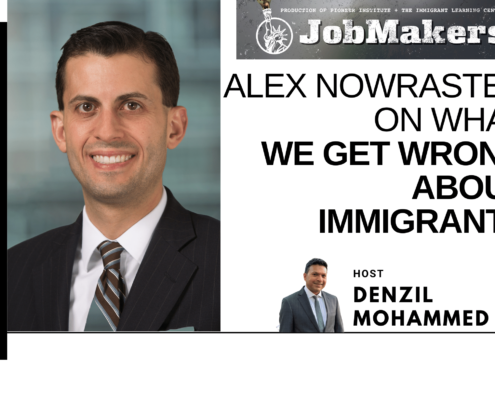
Alex Nowrasteh on What We Get Wrong About Immigrants
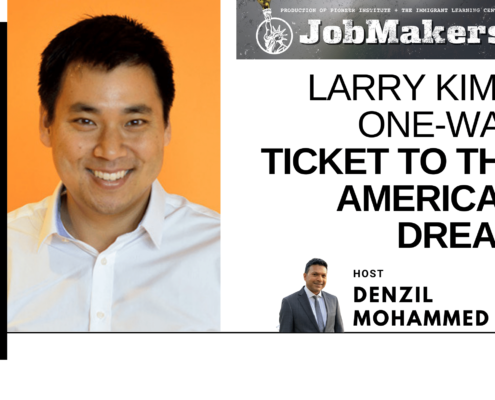
Larry Kim’s One-Way Ticket to the American Dream
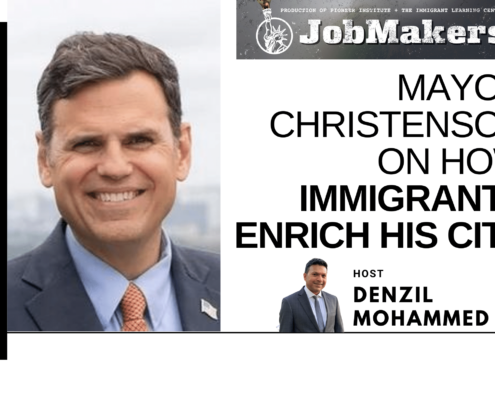
Mayor Christenson on How Immigrants Enrich His City
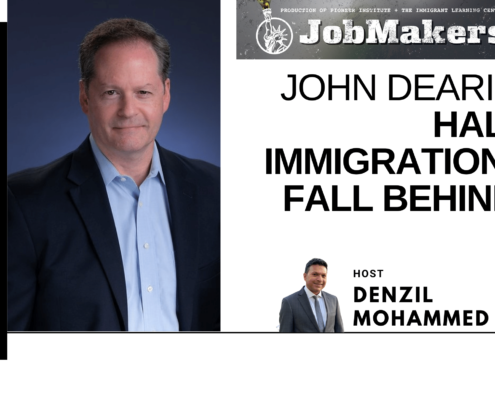
John Dearie: Halt Immigration? Fall Behind
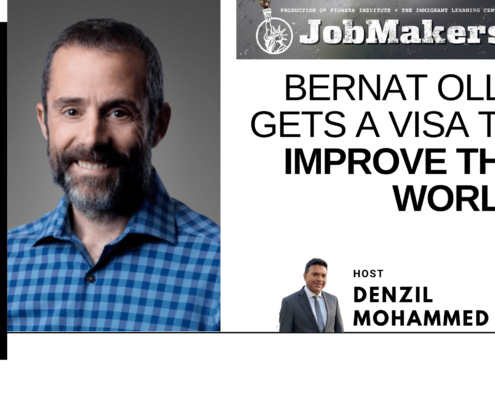
Bernat Olle Gets a Visa to Improve the World
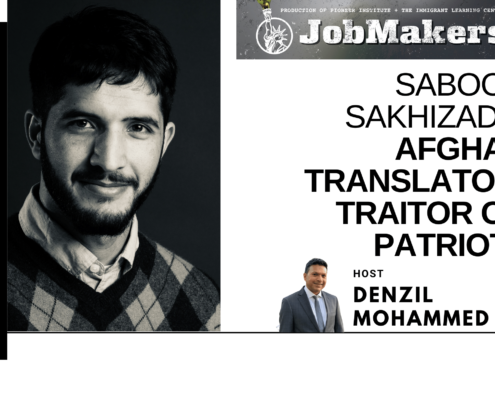
Saboor Sakhizada, Afghan Translator: Traitor or Patriot?
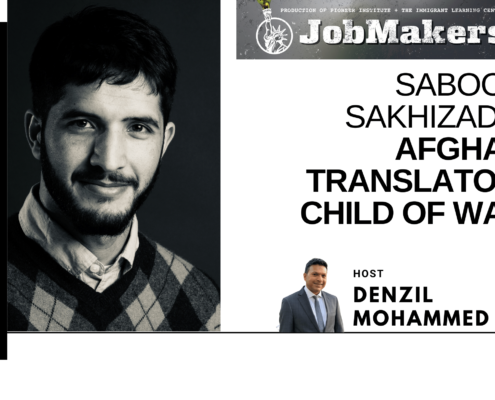
Saboor Sakhizada: Afghan Translator, Child of War
